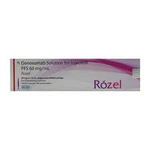Odensomab 60mg Prefilled Injection 1s
Odensomab 60mg Prefilled Injection 1s is employed to treat osteoporosis, a condition prevalent in postmenopausal women where bones become fragile and more susceptible to fractures. This medication's primary function is to curb bone breakdown, thereby contributing to the preservation of bone density and strength.
Denub injection which is a combination of Denosumab acts by targeting a specific receptor in the body, effectively hindering bone resorption, the process where bones are broken down. By impeding this natural process, Denosumab assists in maintaining bone density and strength, notably beneficial for osteoporosis management.
This medicine should be administered by a healthcare professional and not self-administered. Patients should refrain from taking it independently and should wait for guidance from their doctor or nurse regarding the dosage and administration procedure.
Common side effects associated with Denosumab may include red and itchy skin, oozing or crusty blisters on the skin, peeling skin, back pain, and pain in the arms
Patients under this treatment should inform their dentist before undergoing any dental procedures. Additionally, any persistent jaw pain or swelling should be promptly reported to the healthcare provider. Maintaining good dental hygiene and attending regular dental checkups is advisable while on this medication. Consulting the doctor about any history of calcium or vitamin D deficiencies is also recommended.
If a dose is missed, it should be given as soon as possible. However, it's essential to follow the guidance of the healthcare professional regarding the missed dose and subsequent dosage schedules.
Similar Medicines
Disclaimer : This information is not a substitute for medical advice. Consult your healthcare provider before making any changes to your treatment . Do not ignore or delay professional medical advice based on anything you have seen or read on Medwiki.
Odensomab 60mg Prefilled Injection 1s
Prescription Required
Packaging :
packet of 1 prefield syringe
Manufacturer :
Lupin LtdComposition :
Denosumab (60mg)

















.svg)
